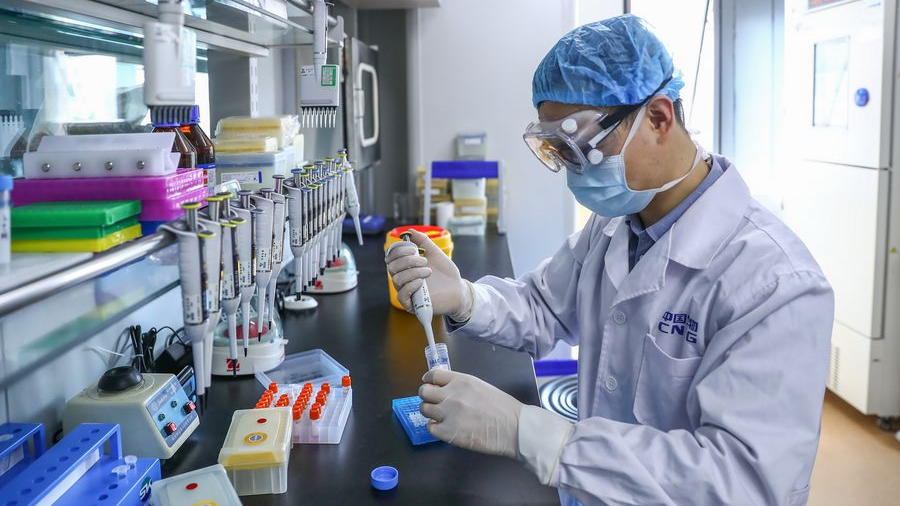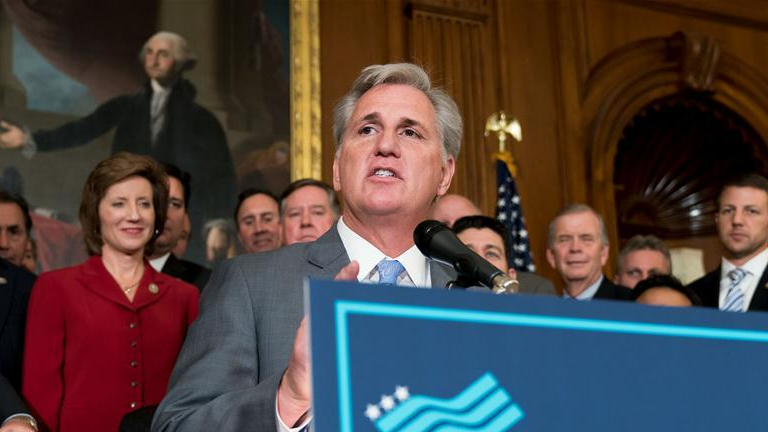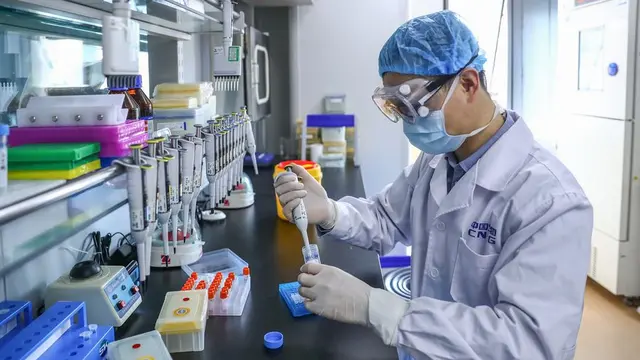
A staff member tests samples of the COVID-19 inactivated vaccine at a vaccine production plant of China National Pharmaceutical Group (Sinopharm) in Beijing, capital of China, April 11, 2020. /Xinhua
**Editor's Note: **Seymur Mammadov is the director of the international expert club EurAsiaAz and editor-in-chief of Azerbaijan news agency Vzglyad.az. The article reflects the author's opinions, and not necessarily the views of CGTN.
Recently, another accusation was made against China from the United States. The Wall Street Journal published an article accusing China of creating "talent search programs" to steal intellectual property. It is reported that China is trying to gain access to the scientific developments of the United States and some other countries using a certain "network" of scientists set up for this purpose.
As you know, fear has large eyes. The fear of the strengthening of China completely deprived Washington of peace, and American political strategists have no choice but to bring the evidence base under the fabrications of "scientific and economic espionage" of the Chinese.
Persecution has always been a feature of American politics. After the exacerbation of the trade war with China, this feature became especially pronounced. In this case, the United States is playing on the widespread notion that the Chinese are counterfeiters, stealing the fruits of someone's intellectual labor. But in fact, this opinion does not at all reflect the current realities of China.
The current development model of China is based on the improvement of quality as the basis for economic growth. China has moved toward the effective use of its own intellectual potential.
According to the World Intellectual Property Organization (WIPO), in 2015, China filed more patent applications than any other country in the world. And in 2016, Chinese companies broke their record with over 1.3 million patents, more than the United States, Japan, Korea and the EPO (European Patent Office) countries combined. For comparison, 41,000 patents were registered in Russia in the same year. Further, more than half of the 406 blockchain-related patents in 2017 were obtained by China.
Nowadays, the dominance of China with more than 40 percent of all patent applications is an established fact. The world leader in patenting is the Chinese tech giant Huawei. This company has repeatedly become the largest applicant company in Europe, according to the EPO.

Kevin McCarthy addresses a news conference in Washington DC, U.S., November 16, 2017. /Xinhua
For 2020, China has set a goal of achieving a high level in the creation, use, protection and management of intellectual property rights.
Beijing has made no secret that it seeks to bring its systems of compliance with an effective intellectual property rights regime in line with other advanced systems in the United States and Europe. This strategic goal was set in 2008 and today China is trying to adhere to the declared guidelines.
Today's China is not the country that was rising to its feet 20 years ago. Today, it is very strong on its feet, and Chinese companies are gradually, unobtrusively and effectively making a large contribution to the global market with high-quality and patented products.
China is even more interested than the United States in the durability of intellectual property protection at the global level, especially for the safety of its own developments.
It is worth recalling here that in 2014, the first specialized IP courts opened in Beijing, Shanghai and Guangzhou. In 2017, the number of patent infringement cases had already reached 71,000. Moreover, the cases are being examined by specialists trained in Germany and the UK.
The United States has launched various programs to discredit China in an attempt to show the world community that Beijing is unable to create its own smart designs. The main goal, of course, is to portray China as an intellectual property thief against the backdrop of its significant advances in high technology.
One of these programs is trying to approve the bill introduced by Kevin McCarthy, the Republican leader in the U.S. House of Representatives, on sanctions for theft of research to combat COVID-19.
The question arises as to how could hackers sponsored by Chinese authorities try to steal the information on COVID-19 vaccine research and development, while China's State Intellectual Property Office issued the first patent for a vaccine against coronavirus?
The patent was awarded to the Academy of Military Medical Sciences of the People's Liberation Army and CanSino Biologics. Testing in mice and guinea pigs has shown that the drug has good immunogenicity. In addition, it is reported that the vaccine can be easily manufactured, allowing for rapid mass production.
And note that this is a purely Chinese development. What kind of "theft" of intellectual property the United States is talking about in this case is completely incomprehensible.
(If you want to contribute and have specific expertise, contact us at [email protected].)
 简体中文
简体中文








